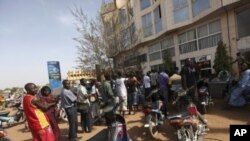The United Nations Security Council is holding an emergency meeting on Mali Tuesday, as military coup leaders remain in power and West African nations levy diplomatic and financial sanctions on the country.
Leaders from the Economic Community of West African States, or ECOWAS, decided Monday to close all borders between Mali and member states, and cut off the currency flow to the country, which relies on the region's central bank.
On Tuesday, long lines formed at gas stations in the capital, Bamako, where many residents turned up with jerrycans and plastic jugs. Many said they are stockpiling fuel because they are worried the country will soon run out.
Former Nigerian president Olusegun Obasanjo said he is confident ECOWAS can resolve the crisis. The group should encourage soldiers to return to their barracks, followed by a transition to elections and a return to democracy, said Obasanjo.
"We have to acknowledge what you may call legitimate complaints of the military, that they were given [a] task without adequate tools to perform the task," he said. "I think our leaders having acknowledged that legitimate situation that you found yourself, but the way you've gone about it is not the right way, and that way is not acceptable."
Photo Gallery
Soldiers seized power from President Amadou Toumani Toure on March 22, accusing him of failing to provide the army with enough resources to stop Tuareg rebels in the north.
Rebels launched an offensive on Friday and rapidly seized three key cities that were still under army control.
The Tuareg Uprising
- Tuaregs are an ethnically Berber, nomadic people in West Africa's Sahel and Sahara regions.
- Tuareg fighters have staged multiple uprisings in Mali and Niger for greater autonomy.
- Current Mali rebellion began in January after Tuareg fighters returned from Libya, where they fought for Moammar Gadhafi.
- The conflict has driven about 100,000 Malians to neighboring countries, internally displaced more than 90,000.
- Losses to Tuaregs prompted soldiers' coup in Bamako Thursday March 22.
On Tuesday, the United Nations said at least 200,000 people have fled the unrest in northern Mali, roughly half of them seeking refuge in neighboring Burkina Faso and Mauritania.
The heavily armed rebels arrived in northern Mali after the fall of neighboring Libya and launched an insurgency in mid-January. Tuareg separatists have been seeking autonomy for decades.
The ECOWAS heads of state met in Senegal's capital, Dakar, after the end of a 72-hour deadline for Mali's military junta chiefs to restore constitutional order.
Coup leader Captain Amadou Sanogo pledged to organize a democratic vote and vowed not to seek office. However, ECOWAS said the junta must take concrete action.
The regional bloc has put a military force on standby.
Some information for this report was provided by AP.




